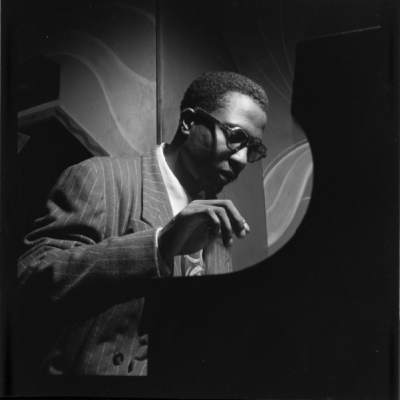.
.
photo by William Gottlieb/Library of Congress

Thelonious Monk, Minton’s Playhouse, New York, N.Y., ca. Sept. 1947
.
.
Thelonious Monk’s “Bright Mississippi”
on a bluff
above the river near Vicksburg
the miscreant cannons’ faint echo
…………………………………………………..dull & distant
fades as the music rises
below
the careless water
flows ceaselessly
unable to weaken prevailing gravity
from source to mouth
strengthened by its own continuity
across landscape unfamiliar to imagine
…………….before such armament roared
view that current long enough
for its virtual denizens to appear
some known some not
vintage or in vogue
…………….regal or obscure
…………………………a King, a Doctor
…………………………..Professor & a Prez
Ahmads, Abdullahs
Lateefs & Toussaints
fed from the World
the World is given in return
……………………….spirited wealth
a noble broadcloth to hand cut & sew
richly restorative robes of rhythm
to wear as often as you choose
.
by Terrance Underwood
.
___
.
What Thelonious Said
……………“There are no wrong notes.”
………………………………….—Thelonious Monk
a credo for Beat poets too:
go with the flow,
improvise,
as if verse was jazz,
and don’t depend
on revision
and concision
or a moment’s indecision.
Yeah, man . . . go man, go –
on with the show.
Yeah . . .
.
by George Held
.
.
___
.
.
Terrance Underwood is a retired Rolls-Royce Service Engineer, veteran, College Grad (B.A. History) who has been listening to recorded jazz music since he was 5-6 yrs old. One of his first memories is listening to a 78 version of “Cherokee” by Charlie Barnett.
.
.
___
.
.

George Held listened to jazz in the old days at the Village Vanguard, the Blue Note, Small’s, and Eddie Condon’s, among other venues. He once talked (by phone) with Ornette Coleman about writing his biography but realized he knew too little to attempt it.
.
.
Listen to a 1962 recording of Thelonious Monk playing “Bright Mississippi,” with Charlie Rouse (tenor saxophone), John Ore (bass), and Frankie Dunlop (drums)
.
.
Click here to read an interview with Robin D.G. Kelly, author of Thelonious Monk: The Life and Times of an American Original
.
.
.

































Both Monk poems are impressive for the subject matter and beautiful conciseness. Bright Mississippi is one of my favorite Monk compositions as well. Interesting connection with the Beats as we know Ginsberg loved Monk and had many conversations with him.